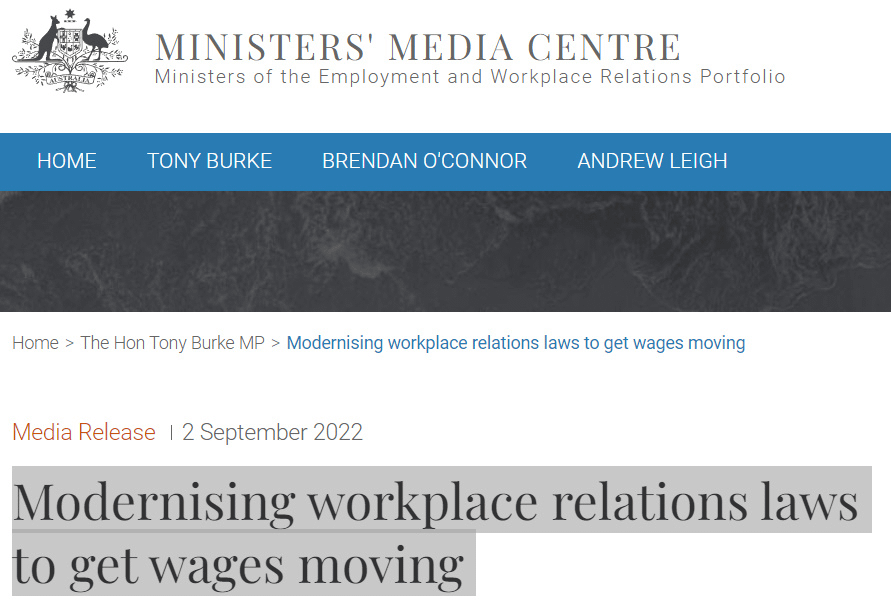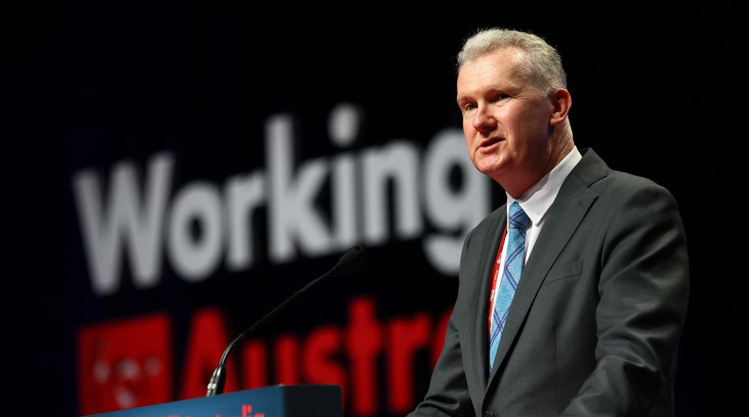Payroll and Award Interpretation Impact on the Full Bill Being Debated.
This will allow you to see what is envisaged by the government. As overviewed by the AFR today
“The Albanese Labor Government will move wages – particularly for women and small business workers – by modernising Australia’s workplace relations laws.
The message from the Jobs and Skills Summit was clear: the agreement-making system is broken, and it’s no longer delivering for employers or workers.
Businesses and unions agree we need a new approach.
We need a new culture of genuine good-faith negotiation.
We need to update our laws for the modern economy.
That’s why the Government will legislate to ensure workers and businesses have flexible options for reaching agreements – including removing unnecessary limitations on access to single and multi-employer agreements.
This will open up agreement-making to workers who currently cannot access the benefits of agreements such as small businesses, women in the care and community services sectors, and First Nations people.
This change will help us close the gender pay gap and address disadvantage.
The Government will also legislate changes to the Better Off Overall Test so it is simple, flexible and fair.
The BOOT should act as an incentive to boost wages and conditions – not as red tape that prevents agreements altogether.
The Government will also amend the Fair Work Act to give the Fair Work Commission the capacity to proactively help workers and businesses reach agreements, particularly new entrants and SMEs.
Our changes will also close loopholes in the Fair Work Act that drive wages down.
Separately, the Government will act on other summit agreements between industry and unions to:
-
Give the Fair Work Commission scope to set minimum standards in the road transport sector to improve safety
-
Establish a National Construction Industry Forum that will bring industry and unions together to address issues such as mental health, safety, training, productivity, culture, diversity and gender equity.
These changes add to the election commitments we made that will create secure jobs, better pay and a fairer system.”
The Full Bill Outline
The Fair Work Legislation Amendment (Closing Loopholes) Bill 2023 (Bill) would amend the Fair Work Act 2009 (FW Act) and related legislation to improve the workplace relations framework by:
-
Improving job security by replacing the existing definition of ‘casual employee’ with a fair and objective definition and by introducing a new employee choice pathway for eligible employees to change to permanent employment if they wish to do so.
-
Addressing anomalous consequences of the small business redundancy exemption in insolvency contexts by providing an exception to its operation when a larger business downsizes to become a smaller business employer due to insolvency and
-
Making targeted amendments to the bargaining framework by:
-
- Enabling multiple franchisees to access the single-enterprise stream;
- Allowing supported bargaining and single interest employer agreements to be replaced by single-enterprise agreements at any time if certain conditions are met
- Authorising the Fair Work Commission (FWC) to make and vary enterprise agreement model terms for flexibility, consultation and dispute resolution in place of the existing provisions according to which these terms are made by regulation.
- Protecting bargained wages in enterprise agreements from being undercut by the use of labour hire workers who are paid less than those minimum rates.
- Supporting workplace delegates by providing a framework for delegates’ rights and including protections for workplace delegates when seeking to exercise those rights.
- Establishing a new protected attribute in the FW Act to improve workplace protections against discrimination for employees who have been, or continue to be, subjected to family and domestic violence.
- Changing the defence to misrepresenting employment as an independent contractor arrangement, known as ‘sham contracting’ from a test of ‘recklessness’ to one of ‘reasonableness’.
- Enabling a registered organisation to obtain an exemption certificate from the FWC to waive the 24 hours’ notice requirement for entry if they reasonably suspect a member of their organisation has been or is being underpaid.
- Empowering the FWC to take action in relation to the future issue of such exemption certificates if those rights are misused (for example, by imposing conditions, or banning their issue for a specified period).
- Increasing maximum penalties for underpayments by amending the civil penalties and serious civil contravention frameworks, and adjusting the threshold for what will constitute a serious contravention.
- Clarifying that Fair Work Ombudsman (FWO) compliance notices can require an employer to calculate the amount of an underpayment that is owed to an employee, and that a court can order the recipient of the notice to comply with its terms.
- Repealing amendments made by the Fair Work (Registered Organisations) Amendment (Withdrawal from Amalgamations) Act 2020, relating to the withdrawal of parts of amalgamated organisations (de-merger).
- Introducing a new criminal offence for wage theft, which applies to intentional conduct.
- Inserting into the FW Act an interpretive principle for determining the ordinary meanings of ‘employee’ and ‘employer’ for the purposes of the FW Act. This would enhance fairness by requiring consideration of the real substance, practical reality and true nature of the relationship by reference to the totality of the relationship between the parties.
- Allowing the FWC to set fair minimum standards for ‘employee-like’ workers, including in the gig economy.
- Allowing the FWC to set fair minimum standards to ensure the Road Transport Industry is safe, sustainable and viable.
- Allowing the FWC to deal with disputes about unfair terms in services contracts to which an independent contractor is a party.
- Repealing a sunsetted clause regarding applications to vary modern awards if already being dealt with in a four yearly review.
- Extending the functions of the Asbestos Safety and Eradication Agency to address silica related diseases
- Introducing a presumption according to which first responders covered by the Safety, Rehabilitation and Compensation Act 1988 (SRC Act) who sustain post-traumatic stress disorder (PTSD) will not have to prove their employment significantly contributed to their PTSD for the purpose of their workers’ compensation claim.
- Introducing a new offence of industrial manslaughter in the Work Health and Safety Act 2011, reflecting recommendations 23b of the Review of the Model Work Health and Safety Laws
The full Bill is available on the Parliament Web Site


